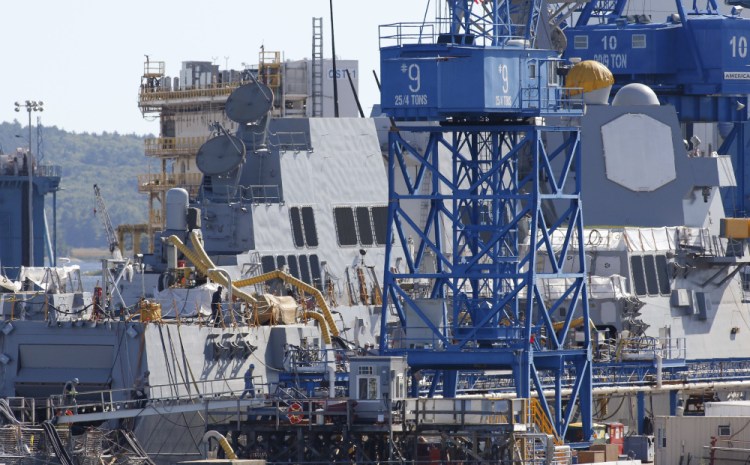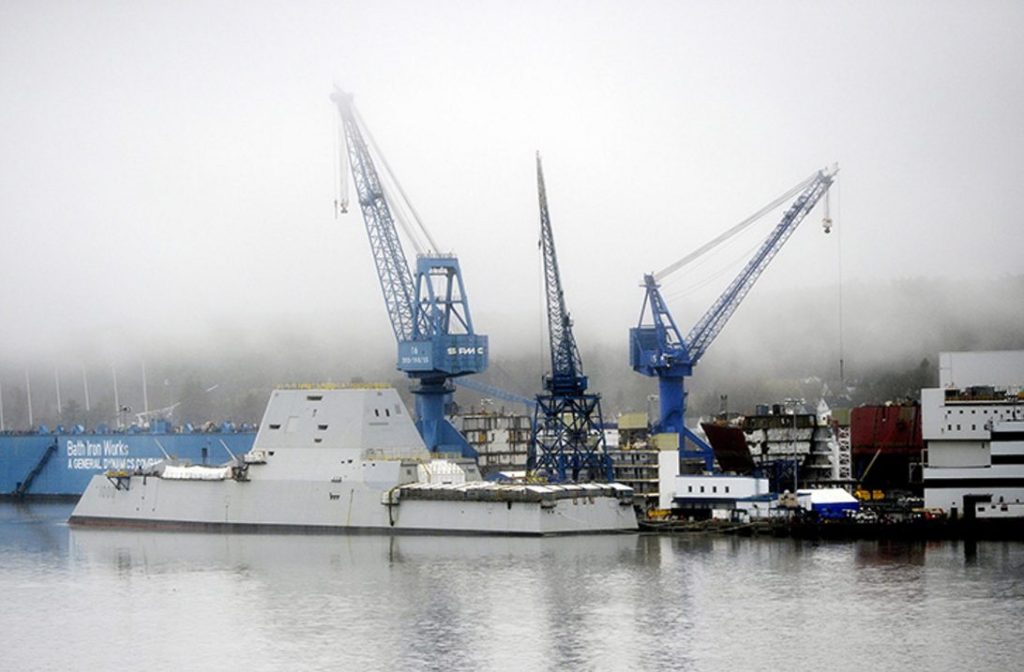AUGUSTA — Bath Iron Works representatives urged Maine lawmakers Tuesday to renew $60 million in tax credits to help the shipyard compete for Navy work, but opponents dismissed the proposal as “corporate welfare” for BIW’s massive parent company.
Over the past 20 years, BIW has received $3 million annually in tax incentives from the state under a custom-made program intended to encourage the Bath shipyard to invest in facilities and hire workers. With those tax credits scheduled to expire this year, BIW is asking for an additional $60 million in tax incentives over the next 20 years conditioned on the company’s pledge to invest at least $100 million in the shipyard and maintain a payroll of at least 5,000 workers.
Testifying before the Legislature’s Taxation Committee, BIW Vice President and General Counsel Jon Fitzgerald said the company has invested more than $500 million in the shipyard since 1996 – more than double the $200 million required by the expiring tax incentives bill. In turn, those investments have helped BIW compete for contracts at a time when the Navy has scaled back its shipbuilding program and put even more emphasis on per-ship costs, he said.
“The past bill was a great benefit to Bath Iron Works and the state of Maine, and I believe we delivered on the value that was hoped for in that bill,” Fitzgerald said. “Over that time, we invested over half-a-billion dollars and we gained work that we wouldn’t otherwise have had.”
CRITICS CITE PARENT’S PROFITS
Meanwhile, most opponents of the bill, L.D. 1781, focused not on the finances of BIW, but on the billions of dollars in profits reaped by parent company General Dynamics. One of the world’s largest defense contractors, General Dynamics reported $31 billion in revenues in 2017 and $2.9 billion in earnings for the year.
“This bill is nothing more than a $60 million gift to the General Dynamics Corporation,” said John Morris, a New Gloucester resident who has protested BIW’s sole focus on building warships. “They don’t need it. They don’t need $60 million. I don’t think they need 60 cents. They are awash in money, and I also think that they are going to do with Bath Iron Works what they are going to do, regardless of whether they get a $60 million tax credit or not.”
The debate over BIW’s tax package comes at a time when some lawmakers and outside groups are calling for more transparency and accountability in taxpayer-financed business incentive programs. The state’s watchdog agency, the Office of Program Evaluation and Government Accountability, now reviews individual programs and has noted that many of them lack reporting requirements, clawback provisions or other accountability measures.
The sponsor of the BIW tax incentives bill, Rep. Jennifer DeChant, D-Bath, acknowledged those concerns and plans to submit an amended bill that strengthens the reporting and evaluation requirements.
The debate also comes at a potentially pivotal time for BIW, a century-old shipyard that has produced more than half of the U.S. Navy destroyers patrolling the world’s oceans. With roughly 5,600 workers and a payroll of $350 million, BIW is one of Maine’s largest private employers.
On Thursday, the Navy is expected to formally kick off the bidding competition for the next round of Arleigh Burke-class destroyers. BIW’s per-ship costs were significantly higher than its sole competitor, Huntington Ingalls shipyard, during the last multi-ship contract awarded in 2013. As a result, BIW nearly lost one destroyer – representing years of work and more than $1.5 billion – to its Mississippi competitor.
BIW also failed to win a competition to build up to 25 Coast Guard cutters in 2016, a loss that once again focused attention on the facility’s costs relative to those of its competitors. But BIW recently submitted a bid to build 20 next-generation Navy frigates, a contract worth up to $19 billion.
On the upcoming destroyer competition, Fitzgerald said it’s unclear whether the contract will be for 10 or 15 ships.
“From prior discussions (with the Navy), we’ve understood that it may not be an equal award and that the low-cost bidder is, not surprisingly, going to win more work,” Fitzgerald said. “So we are hoping to win at least five ships, but we need to win more. … Five ships would keep us and sustain us probably at the levels we are at now.”
BIG IMPACT ON ECONOMY
Fitzgerald repeatedly deflected questions from committee members about General Dynamics’ profits, stock buy-backs or executive salaries, saying BIW is a separately held, privately owned Maine corporation. But he said General Dynamics plans to invest $100 million in BIW and hire an additional 500 people over the next year.
Dana Connors, president of the Maine State Chamber of Commerce, noted that the average salary at BIW is $60,820, which is $16,000 more than the statewide average. Connors also noted that BIW does $45 million worth of work for nearly 300 other Maine companies, meaning the tax credit would “secure our shipbuilding future … and serve the economy of our entire state.”
The more than one dozen opponents of the bill, however, portrayed General Dynamics as a corporate giant trying to take advantage of Maine and other states where it has facilities. They noted that General Dynamics is also seeking tax incentives in Connecticut and Rhode Island at a time when it has spent billions of dollars buying back its own stock.
Speakers railed against the influence of “the military industrial complex” in Washington, D.C., and called on BIW to begin transitioning to manufacturing non-defense products such as wind turbines and bridge or railroad components. Most of the critics said Maine needs that $60 million for other programs, including improving public schools, addressing the opioid crisis or fixing the state’s roads or highways.
“This bill is no good for Maine,” said Jason Rawn of Lincolnville, who along with Morris was among a dozen activists arrested while protesting a June 2016 ship christening at BIW. “As one of the poorer states in the union, we don’t have $60 million more in taxpayer generosity to spare. We need to invest in health care, education, infrastructure, cleaning up the Kennebec (River) after decades of industrial pollution by General Dynamics, et cetera.”
The committee had not yet scheduled a work session on L.D. 1781.
Kevin Miller can be contacted at 791-6312 or at:
Twitter: KevinMillerPPH
Send questions/comments to the editors.





Comments are no longer available on this story